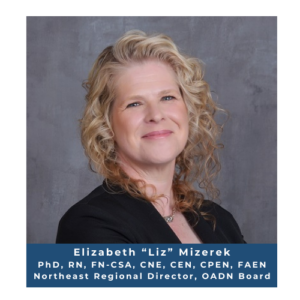April 28, 2025
Dear OADN Members,
Fresh data from the 2024 National Nursing Workforce Survey, conducted by the National Council of State Boards of Nursing (NCSBN), provides timely validation of the critical role Associate Degree in Nursing (ADN) programs continue to play in educating and advancing the U.S. nursing workforce.
(NCSBN), provides timely validation of the critical role Associate Degree in Nursing (ADN) programs continue to play in educating and advancing the U.S. nursing workforce.
As the national voice for ADN programs, OADN is proud to share these insights. We’re also inviting you to help shape the future through your participation in our 2025 National Survey of Associate Degree Nursing Programs.
According to the 2024 NCSBN survey, 34.2% of RNs earned their initial U.S. nursing license through an associate degree program—underscoring ADN education as one of the dominant pathways into the profession. ADN programs remain essential to meeting workforce demand, especially in rural, underserved, and community-based settings where they remain the most accessible route to licensure.
What’s more, ADN graduates are not standing still. Nearly 48% of all RNs now hold a baccalaureate degree, many of whom began their journey in ADN programs. This trend reflects the strong academic progression and lifelong learning culture fostered by ADN educators and supported by increasingly seamless transfer and bridge pathways.
Another major achievement revealed in the data: the proportion of Hispanic RNs has doubled since 2015, rising from 3.6% to 7.2% in 2024. This growth is a testament to the vital role ADN programs play in expanding access to nursing education, particularly among underrepresented and first-generation college students.
With their lower costs, local accessibility, and community-rooted mission, ADN programs have been key drivers of a more inclusive and representative nursing workforce—a necessity for equitable care in today’s healthcare environment.
At this critical moment, OADN is continuing our own national research initiative: the 2025 National Survey of Associate Degree Nursing Programs, first launched in 2022. This year, the survey includes new focus areas on faculty capacity and pipeline concerns, while streamlining student-related questions to keep the process efficient.
Your participation ensures that real-world data from ADN programs:
Results have been cited in NCSBN’s Environmental Scans and published in Teaching and Learning in Nursing, enhancing the visibility and credibility of the associate degree pathway.
We kindly remind all deans and directors to complete the survey when they receive it. Your input is essential to building an accurate, actionable picture of the ADN landscape.
The 2024 workforce data make one thing abundantly clear: ADN education provides a strong and enduring foundation for professional advancement and leadership in nursing. Our programs foster lifelong learners, expand workforce diversity, and respond to the evolving needs of today’s healthcare system.
Let’s continue to lead with data, purpose, and pride.
Elizabeth Mizerek PhD, RN, FN-CSA, CNE, CEN, CPEN, FAEN
Director, Northeast Region
OADN Board of Directors